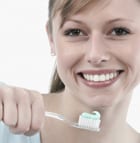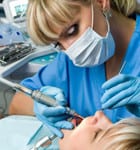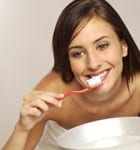 Bad breath strikes everyone at some point in their lives. You can significantly reduce the chances of it occurring by following the dental health routine suggested by your Leeds dentist. Known medically as ‘halitosis’, bad breath is unpleasant for yourself and for those around you. If it is persistent it can be a sign of more serious underlying problems and you should speak to your dentist about this.
Bad breath strikes everyone at some point in their lives. You can significantly reduce the chances of it occurring by following the dental health routine suggested by your Leeds dentist. Known medically as ‘halitosis’, bad breath is unpleasant for yourself and for those around you. If it is persistent it can be a sign of more serious underlying problems and you should speak to your dentist about this.
The major cause of bad breath is the breaking down of food particles, that remain in your mouth after eating, by naturally occurring bacteria. The best preventative measure for bad breath is to have a regular process of cleaning your teeth. Brushing should be done at least twice a day, a third time is can also be beneficial. Using a fluoride tooth paste this also combats the onset of tooth decay which can cause pain, discomfort and the loss of teeth. Many people find that brushing is not enough to combat bad breath, flossing alongside brushing will also have a significant impact. Flossing is particularly effective because over time food particles become stuck between your teeth where your brush simply cannot reach. Over time this food decomposes and creates the unpleasant odour associated with bad breath. Tongue cleaning can also help to remove any excess bacteria or food that builds up on the tongue.
Bad breath can ruin your social life and destroy your self-esteem. Make sure you continue this simple dental routine and you will most likely prevent bad breath. If it is persistent, try altering your diet to blander foods for a while and see if this makes a difference. If the bad breath is accompanied with any other symptoms, such as inflamed gums, toothache, or any others, makes an appointment with your dentist and they will be able to check for any other causes.
















